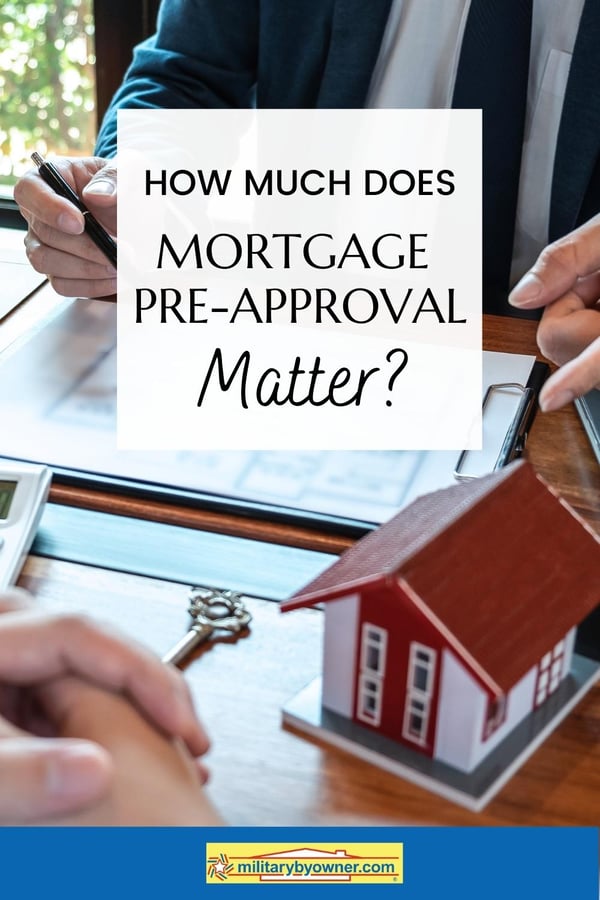How Much Does Pre-Approval Matter for My Home Mortgage?
Pre-approval letters aren’t the most exciting part of the military home-buying process, by far. They can’t compete with the experience of choosing between the to-die-for house with the sitting room off the primary suite or the picture-perfect home style with the wrap-around front porch.
But rest assured, a mortgage pre-approval letter matters. Little about the home buying process is more important than obtaining your pre-approval. It solidifies your financial well-being, attracts lenders (including VA loan lenders), and helps you move into the home of your dreams faster. Without pre-approval, you’ll run into a long list of problems that can set your house hunt back months.
If you’re wondering how to prepare to buy your first home (or any home buyer, for that matter), you can avoid these devastating scenarios if you have a pre-approval letter in hand.
 Situations You'll Avoid with a Loan Pre-Approval
Situations You'll Avoid with a Loan Pre-Approval
1. You find the home of your dreams and plan to take a tour but:
- Your real estate agent didn’t ask for your pre-approval letter before showing the house, and the seller won’t play ball unless you’re approved.
- You’re in talks with a for sale by owner seller who didn’t know they could require your pre-approval letter, but later gets the excellent advice to check out your approval. Unfortunately, since you don’t have proof you’re financially secure, the seller moves on to better-qualified buyers.
2. You submit an offer on the home, and one of two things happens:
- The seller rejects your offer in favor of another with a tight pre-approval letter. The seller was confident that the competing buyer was serious about the sale, and it was apparent from the pre-approval they could officially afford the property.
- Or, somehow, your offer, without pre-approval, is accepted.
3. After the offer is accepted, you immediately order a home inspection and try to move forward with financing but find out:
- You don’t qualify for the purchase agreement price because your debt-to-income ratio is too high. Even if you know you can cover the monthly mortgage, interest, insurance, and taxes, the lender doesn’t have to agree.
- You qualify for a mortgage large enough to cover the price, but the lender determines you’ll need more money than you can afford for a larger down payment.
Familiarize yourself with these resources if it's been a while since you’ve bought a house or you’re new to the home buying process.
Now, here's how to avoid the disappointment of losing an opportunity to buy a house you had your heart set on and answer the question, "What do I need to buy a house?"
 Photo by FabioBalbi from Getty Images via Canva.com
Photo by FabioBalbi from Getty Images via Canva.com
Steps for Getting Home Loan Pre-Approval
1. Review your credit reports for errors or fraud issues that could stop you from attracting lenders willing to work with your finances.
Pre-approval letters use your credit reports to ensure you’re a solid financial risk. You might have a credit report and credit score accessible through your bank, or you can check out a free service such as annualcreditreport.com. Correct minor problems like address or name, but give yourself plenty of time to fix major issues like identity theft.
2. Get expert help calculating a pre-qualification amount.
Pre-qualification is different from pre-approval and is one of the first home-buying steps. A pre-qualification approval is an amount a lender estimates you’ll be approved based solely on self-reporting numbers. With the pre-qualification information, you’ll have a ballpark range of sale prices you can afford.
Many factors determine the amount, like your income and the types of debt you have. You can complete a pre-qualification form to get more information through MilitaryByOwner’s partner, Veterans United. It takes just a couple of minutes and doesn’t commit you to anything financial; it's just a reference point.
3. Use the pre-qualification amount as a gauge to begin looking for properties that meet your budget.
Don’t forget to add taxes and insurance to your monthly payment! Did you know that you can calculate your BAH on MilitaryByOwner to compare it against home prices and rent? This can help you stay within your budget while looking for homes near your new duty station.
4. Finally, if you believe home buying is a smart option for your next military move, contact a lender to request your pre-approval letter.
Pre-approval takes longer to process than pre-qualification, and you’ll need an array of documents such as copies of your driver’s license, LES statements, two months of bank statements, W2s, and a copy of orders. While collecting this paperwork is tedious, this isn't the only time you'll need it.
While the pre-approval portion of the buying process isn’t as fun as house hunting, it matters because it ultimately makes your home selection process more efficient. You won’t waste time, and you’ll also know the exact price point where you should focus your search.





